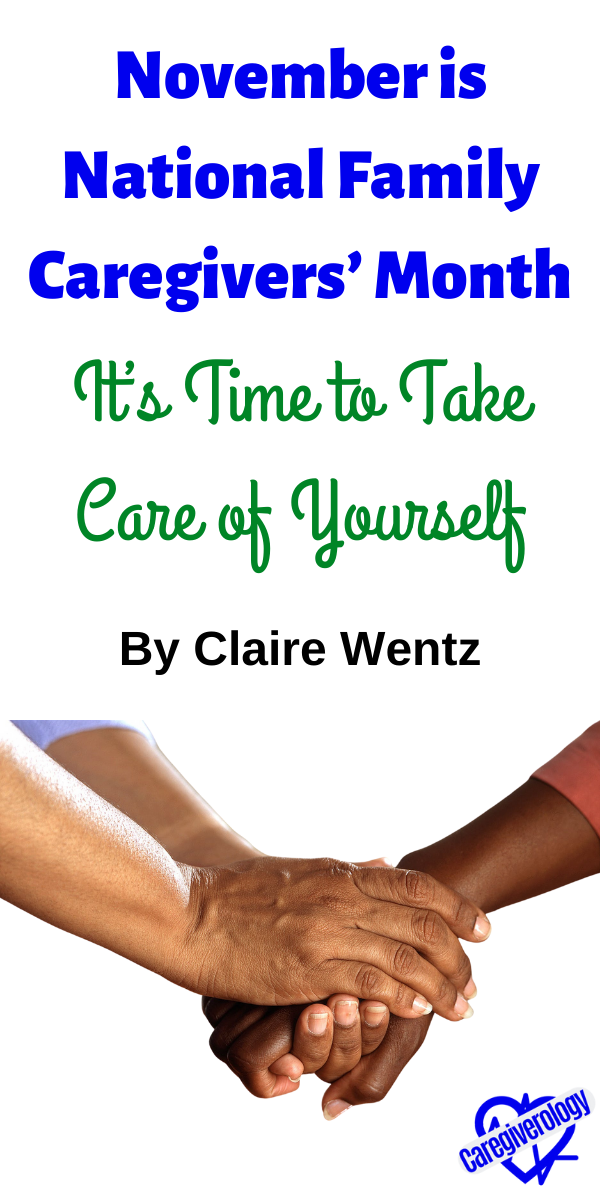November is National Family Caregivers’ Month
It’s Time to Take Care of Yourself
November might be best known for Thanksgiving, but it’s also National Family Caregivers Month. Incidentally, November marks Alzheimer’s Disease Awareness Month as well. While this may be a coincidence, it is no coincidence that many caregivers lovingly deliver non-paid services to their family members with cognitive decline. Unfortunately, this labor of love often leaves caregivers physically and emotionally exhausted.
If you are currently caring for a disabled or elderly family member, then it’s time to channel some of your efforts into yourself. It is not selfish to provide for your own needs; not doing so can make it harder to take care of the people you love the most.
To help, here are a few no-nonsense ways to care for yourself.
Start With Exercise
Nobody has to tell you all of the benefits associated with physical fitness. You already know that it’s important for your overall health. However, when you spend your days wrapped up in someone else’s needs, it can be tough to find the time to head to the gym. One thing you may not have considered, however, is taking your loved one to the gym with you. And, if you happen to be one of the 19 percent of caregivers over the age of 65, you may already have access to the SilverSneakers program, which offers wellness services and no-cost fitness programs.
Eat Right
No article on self-care would be complete without the mention of watching your diet. Even if you think you’re eating well, it’s not going to hurt anything to evaluate your nutritional intake. Think about what you consume on an average day. Does it include a balance of produce, lean proteins, healthy fats, and grains? If not, then it should. And even if you are eating well, your body might still be low on some nutrients. Because of this, it also makes sense to add a quality multivitamin to your daily routine. A good multi will not only fill nutritional gaps, but it may also improve your energy levels, appearance, and gut health.
Sleep Well
You have a huge responsibility, and you may find it difficult to sleep. Whether it’s because of fear and anxiety about your loved one’s health or simply their overnight needs, identify the cause of your sleep deprivation. Compounding these issues, many people have anxiety about not going to sleep. Cleveland Clinic explains that this can leave you feeling more agitated the closer to bedtime the clock ticks. Unfortunately, people who sleep less than seven hours each night tend to have shorter life expectancies. Make a point to give yourself a few hours of quiet time before going to bed and use relaxation tools, such as meditation, to help settle your mind.
Look to the Future
When you’re in the thick of caregiving, it can be hard to look ahead, but if you’ve found that you have a natural gift in caring for others, a nursing career could be the perfect fit. Now more than ever, nurses are in high demand, and whether you pursue a bachelor’s or master’s degree, you can count on steady employment. Plus, online university programs offer plenty of flexibility so that you can balance your coursework with other obligations.
The above actions are a great place to start. However, there are many ways to care for yourself. Your self-care routine may include anything from waking up early to watch your favorite TV show to spending a few precious hours each week devoted to your favorite hobby. Whatever you do, make yourself a priority, even if only temporarily. You will not come across as selfish, and you will be a better caregiver because of it.
Thank you Claire Wentz for contributing this article.
Mental Health and Support Articles
From November is National Family Caregivers’ Month to Home
Recent Articles
-
Common Truck Crash Injuries and Legal Remedies - Caregiverology
Jul 19, 25 10:49 AM
Known for its sun-drenched beaches, vibrant arts scene, and bustling maritime industry, Fort Lauderdale is a city that sees heavy traffic both on its roads and at its busy port. Unfortunately, with th… -
Why Expert Legal Help Matters After Serious Injury - Caregiverology
Jul 19, 25 10:35 AM
In Houston, over 67,600 car crashes occurred in 2023, resulting in 290 fatalities and 1,612 serious injuries. That’s roughly 185 accidents every day. -
How Life Care Planners Support Injury Recovery - Caregiverology
Jul 19, 25 10:18 AM
In Los Angeles, life care planners play a vital role in supporting injury recovery, especially for individuals facing catastrophic injuries such as traumatic brain injuries or spinal cord damage.





New! Comments
Have something to say about what you just read? Leave a comment in the box below.